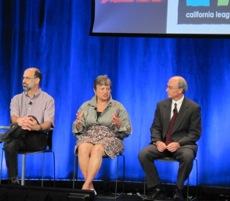Cap-and-Trade is a lonely business these days. But according to the state’s top regulator in charge of implementing it, California won’t go it alone.

Mary Nichols, who chairs the state’s Air Resources Board, made the remark in a Silicon Valley panel discussion today. The ostensible topic of the event was renewable energy but it turned into a pep rally against Proposition 23, the statewide ballot measure designed to halt California’s comprehensive climate law, AB 32. Nichols was joined on the panel by executives from Google, PG&E and venture capitalist Vinod Khosla, all of whom voiced strong opposition to Prop 23.
When asked about the cap-and-trade provisions of AB 32, Nichols said: “We won’t launch this program without partners to trade with. It doesn’t make sense for an economy even as big as California, to try to do this all by ourselves.” The comment came days after congressional leaders threw in the towel for the summer, on a federal bill to address climate change and energy security. “To get the kind of leverage that you really need to make this program succeed, the US has got to step in,” said Nichols.
California is part of a nascent regional trading pact known as the Western Climate Initiative. But among the seven US states and four Canadian provinces signed on to the WCI, only California, New Mexico and Quebec are prepared to move forward with a working carbon trading market. Others still lack enabling legislation, and Arizona has overtly pulled out of the carbon trading plan, raising the question of how many “partners” California will have, even with WCI in the mix.
“I don’t expect to be faced with this dilemma,” Nichols told me after today’s event, “but if the worst were to happen and none of these states were able to move forward with their own programs, I think we would think long and hard about whether we would actually start enforcing the program, unless and until we were really confident that our state had the ability to do it in a way that would not put us at a competitive disadvantage.”
Proponents of Prop 23 contend that full implementation of AB 32 will give other states and nations a competitive edge over California, resulting in “leakage” of jobs and businesses to regions with fewer regulations.
The panel, entitled “Electric Bills and Oil Spills: Will California Continue To Be a Clean Energy Leader?” was held on the Google corporate campus in Mountain View.
One thought on “Nichols: No Solo Cap-and-Trade”
Comments are closed.

NO on AB2289Eng unless amended
What percentage of clean piped cars would pass a Smog Check?
What percentage of cars, not clean piped, would pass a Smog Check?
What percentage of cars that fail a Smog Check and receive a pass after repairs would pass another Smog Check?
What percentage of cars that fail a Smog Check are repaired by auto repair shop for $$ are not Smog Check licensed?
Does DCA/BAR Chief Sherry Mehl audit Smog Checks to see if the fault of a failed car is repaired?
What percentage of tampered Smog Checks are repaired using CAP funds?
What percentage of cars repaired at CAP stations are repaired using CAP funds that do not fail a Smog Check?
Arnold, BAR & CARB using AB 2289 Eng to cut green collar jobs?
http://www.indybay.org/newsitems/2010/04/18/18645036.php
If an elected official would request a copy of the Sierra Research SR 2007-04-01 report and all communication about the report from CCEEB, CED, CARB, DCA/BAR, IMRC, Parsons, SGS Testcom & Sierra Research it might help improve performance of Smog Check…. “Sherry Mehl. The report has been modified since 2001. Continually”
http://www.youtube.com/watch?v=TvB3em82Lkw
CAPP contact: Charlie Peters (510) 537-1796 cappcharlie@earthlink.net